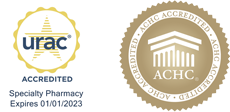For the past year, we have been faced with unprecedented times caused by the COVID-19 pandemic. As of December 2020, we are starting to see the light at the end of the tunnel as vaccines become available.
What are mRNA vaccines?
Traditional vaccines work by using a weakened/inactivate portion of the virus to help our body develop immunity. The COVID-19 mRNA (messenger ribonucleic acid) vaccines contain instructions on how to make a harmless “spike protein” that are unique to the COVID-19 virus. Our bodies then recognize the protein should not be there and build antibodies that remember how to fight the virus if we become infected with it in the future.
Will the COVID-19 vaccine alter my DNA?
No. The COVID-19 vaccine is a mRNA vaccine that does not change or interact with your DNA in any way.
What vaccines are available?
There are currently two COVID-19 vaccines (Pfizer and Moderna) that have been approved by the Food and Drug Administration (FDA). There are 3 other vaccines (AstraZeneca, Janssen, Novavax) currently undergoing Phase 3 clinical trials that could become available once they receive FDA approval.
How many doses of the vaccine do I have to get?
Both Pfizer and Moderna vaccines require two doses spaced 21-28 days apart.
Can I get the COVID-19 vaccine if I have had COVID-19?
The CDC recommends that people who have had COVID-19 still get the COVID-19 vaccine. Since re-infection with COVID-19 is possible, getting the vaccine can still help protect you. However, you should not receive the vaccine if you have a current infection with COVID-19, you should wait until you are no longer symptomatic before receiving the vaccine.
Is the COVID-19 vaccine safe?
The FDA, Centers for Disease Control and Prevention (CDC) and Advisory Committee on Immunization Practices have all been actively involved in the vaccine evaluation process and have deemed the two current COVID-19 vaccines safe.
Can the COVID-19 vaccine make me sick with COVID-19?
No. None of the COVID-19 vaccines contain the live virus that cause COVID-19.
If I get the COVID-19 Vaccine, will I test positive for COVID-19 on a viral test?
No. None of the vaccines currently available for COVID-19 cause you to test positive on a viral test. Getting the vaccine allows your body to develop antibodies against COVID-19 so it is possible to test positive on an antibody test.
How long will the vaccine protect me?
At this time, it is unknown how long protection from the vaccine or from having COVID-19 (natural immunity) will last. More research is needed to know how long the immunity from the COVID-19 vaccine or natural immunity lasts and if a booster dose will be required.
What are the benefits of getting vaccinated?
Both vaccines currently available have shown approximately 95% efficacy 7-14 days after the second dose of the vaccine is received.
Can I get other vaccines along with my COVID-19 vaccine?
The CDC recommends that you do not receive any other vaccines within 14 days of the COVID-19 vaccine.
If I get the COVID-19 vaccine, do I still have to wear a mask?
Yes. Both vaccines currently available are 95% effective meaning that 1 out of every 20 people who have received the vaccine may not have full protection from the vaccine. It is also unknown if you could still be a carrier (have no symptoms) and spread the virus after vaccination. This is why until we know more, you should continue to wear masks and social distance.
How is the vaccine being distributed in North Carolina?
In North Carolina, vaccine distribution is being completed in groups. Availability of the vaccine worldwide is limited, so please be patient. Everyone who wants a vaccine will be able to receive a vaccine, it is just going to take time to get everyone vaccinated since demand is currently higher than the supply.
- Group 1
- Health care workers
- Long-term care staff and residents
- Group 2
- Older adults (65+)
- Group 3
- Frontline Essential Workers
- First responders (firefighters and police officers), correction officers, food and agricultural workers, U.S. postal service workers, manufacturing workers, grocery store workers, public transit workers, and those in the education sector (teachers, support staff and childcare workers)
- Frontline Essential Workers
- Group 4
- Adults at high risk for exposure and increased risk of severe illness
- Anyone 16-64 with high-risk medical conditions that increase the risk of severe disease from COVID-19
- Anyone incarcerated or living in other close group living situations
- Essential workers not yet vaccinated
- Workers in transportation and logistics, water and wastewater, food service, shelter and housing (construction), finance (bank tellers), information technology and communications, energy, legal, media, public safety and public health workers
- Adults at high risk for exposure and increased risk of severe illness
- Group 5
- All persons 16 and older
What should you do while you’re waiting for the COVID-19 vaccine?
Continue to wear your mask over your nose and mouth, social distance at least 6 feet from others that do not live in your household whenever possible, wash your hands often and stay home if you are sick.
What should I expect once I get the vaccine?
The most common side effect from the vaccine is arm soreness/tenderness. Other symptoms include fatigue, low-grade fever, body aches and mild headaches that last one to three days. Side effects are seen more frequent after the second dose. These mild symptoms are your bodies way of telling you that your immune system is responding to the vaccine and producing antibodies to the COVID-19 virus. Meaning if your body sees the virus again it already has antibodies and knows how to respond, either preventing infection or making your infection less severe.
References:
- COVID-19 vaccines. (n.d.). Retrieved February 19, 2021, from https://www.cdc.gov/coronavirus/2019-ncov/vaccines/index.html
- COVID-19 vaccine: What you need to know. (n.d.). Retrieved February 19, 2021, from https://www.hopkinsmedicine.org/health/conditions-and-diseases/coronavirus/covid-19-vaccine-what-you-need-to-know
- Find your spot to take your shot. (n.d.). Retrieved February 19, 2021, from https://covid19.ncdhhs.gov/vaccines/find-your-spot-take-your-shot

